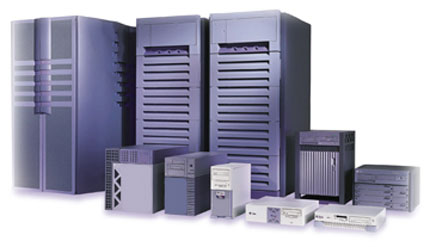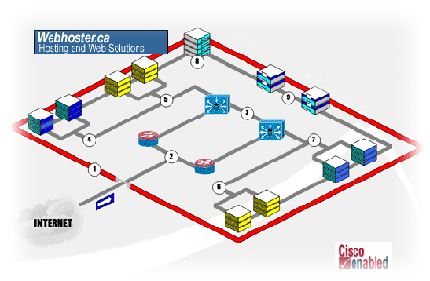AND CHALLENGES
Technical Considerations
High
availability
High availability is essential to web sites if they are going to be
a profitable venture. With the world wide web accessible globally
every effort has to be made to make sites available virtually 24/7. Access
24/7 in not realistic but every effort should be made to get
as close to that standard as possible. Redundant hardware
systems and alternate hosting options should be employed to provide the
greatest availability possible.
Uninterruptible power supplies enable sites to stay up and running for
short periods of time if an establishment power systems fails.
 |
Redundancy
Using redundant hardware systems is a relatively inexpensive way to increase
availability. The cost of the "Iron" has gone down considerably
over the past several generations of hardware. Besides the capital investment
benefits the increased availability to customers and their enhanced satisfaction
can only increase the bottom line profitability to a company.
Inexpensive, compact storage drives enable companies to mirror
information, using raids and balance data access, which improves performance
and availability.
 |
Webhosting.ca's
hosting system for a large e-commerce site with load balancing, redundancy
and backup servers.
Hosting options
A variety of hosting options are available today to companies today. The
serious players on the web are generally using fractional T1 service for
bandwidth and dedicated servers.
Networking devices like these enable fractional T1 support providing options
for connectivity known as collocation. Powerful cost effective servers
enable companies to have greater control and security.
Attacks
 |
Attacks on web sites generally
take shape in three forms. Denial of service, that performs a multitude
of false logons generated by programs that prevent legitimate customers
from accessing the site. Distributed denial of service which high
jack the server(s). And tcp-syn attacks that spawn processes on servers. |
Defense
Various defense methods have been developed to protect web sites from
attacks. They include firewall's which block information from entering
the site, network address translation, that transmit numerous addresses
and demilitarized zones that contain less sensitive information that acts
as a buffer.
Content filtering
Selectively eliminates certain types of information and files from being
able to access the web site.
Virus protection
Prevents known software virus programs from gaining access to the site.
Back to top
The
Future of the Film Industry
Infrastructure
Challenges and
Opportunities
Technical Considerations
High availability
Redundancy
Hosting options
Attacks
Defense
Content filtering
Virus protection